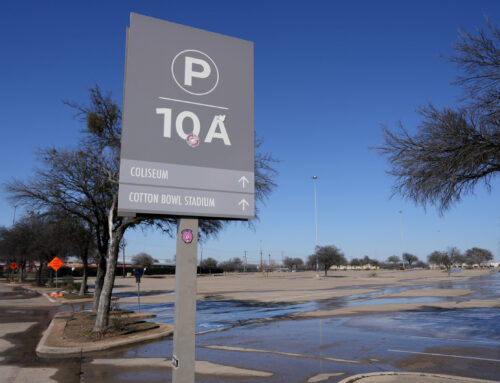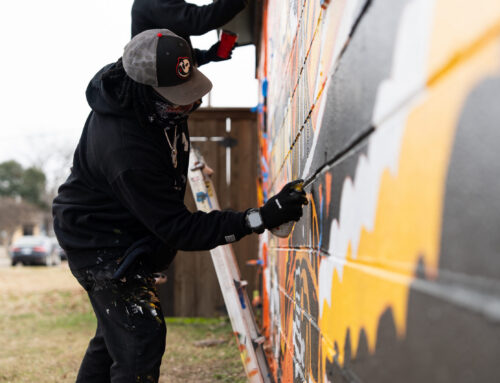Ideal neighborhood unites against potential industrial site, concerns over environmental impact
Sherri Mixon, executive director of T.R. Hoover CDC, walks through Dallas City Hall holding several pages of signatures in her hand. Just last night, residents of Bexar Street Connections Neighborhood Association knocked on doors asking neighbors to unite against what they fear is a possible dump site taking shape behind the railroad tracks, south of Railroad Avenue, parallel to Bexar Street.
“All of those block captains that got signatures understand that all of this pollution that happens will be right here in our very back door and our kids’ school,” Mixon says. “I’m trying to stop it so it doesn’t become Shingle Mountain, or they can use it for burning tires.”
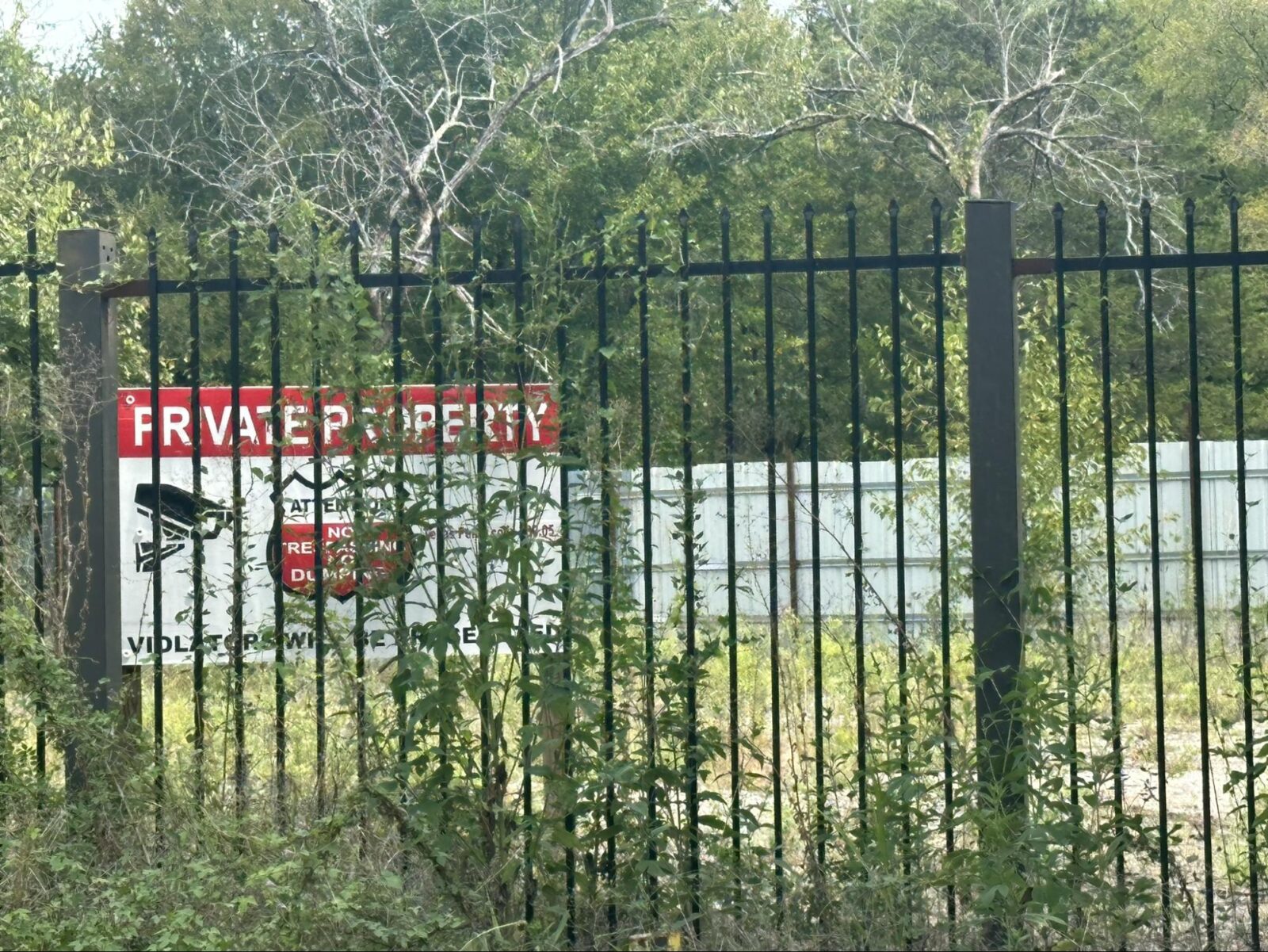
The land behind the railroad tracks is zoned as Industrial Research, also known as IR, which allows for various industrial activities, including manufacturing, warehousing, auto mechanic shops and salvage yards. Shingle Mountain, a reference to the giant mountain of roofing debris left by Blue Star Recycling, which impacted air quality in the neighboring community of Flora Farms, was also zoned “heavy industrial manufacturing” and IR.
“They are building gravel roads. They have cameras up. They have fences up,” Mixon says.
She and other neighbors have watched trucks pass by and have asked who is in charge. Mixon says that information has not been shared.
“Because they know what their zoning is, do they even care about having a conversation with us?” Mixon asks.
Neighbors want a community park for this area behind Railroad Avenue, and that’s what they told City of Dallas planners during the Forward Dallas neighborhood planning process.
The goal of Forward Dallas is to create a comprehensive city plan based on input from neighborhoods, so that when zoning requests come before the City, staff can refer to the plan to make recommendations to plan commissioners and city councilmembers. In the current Forward Dallas proposal, the land behind Railroad Avenue is designated as “regional open space.”
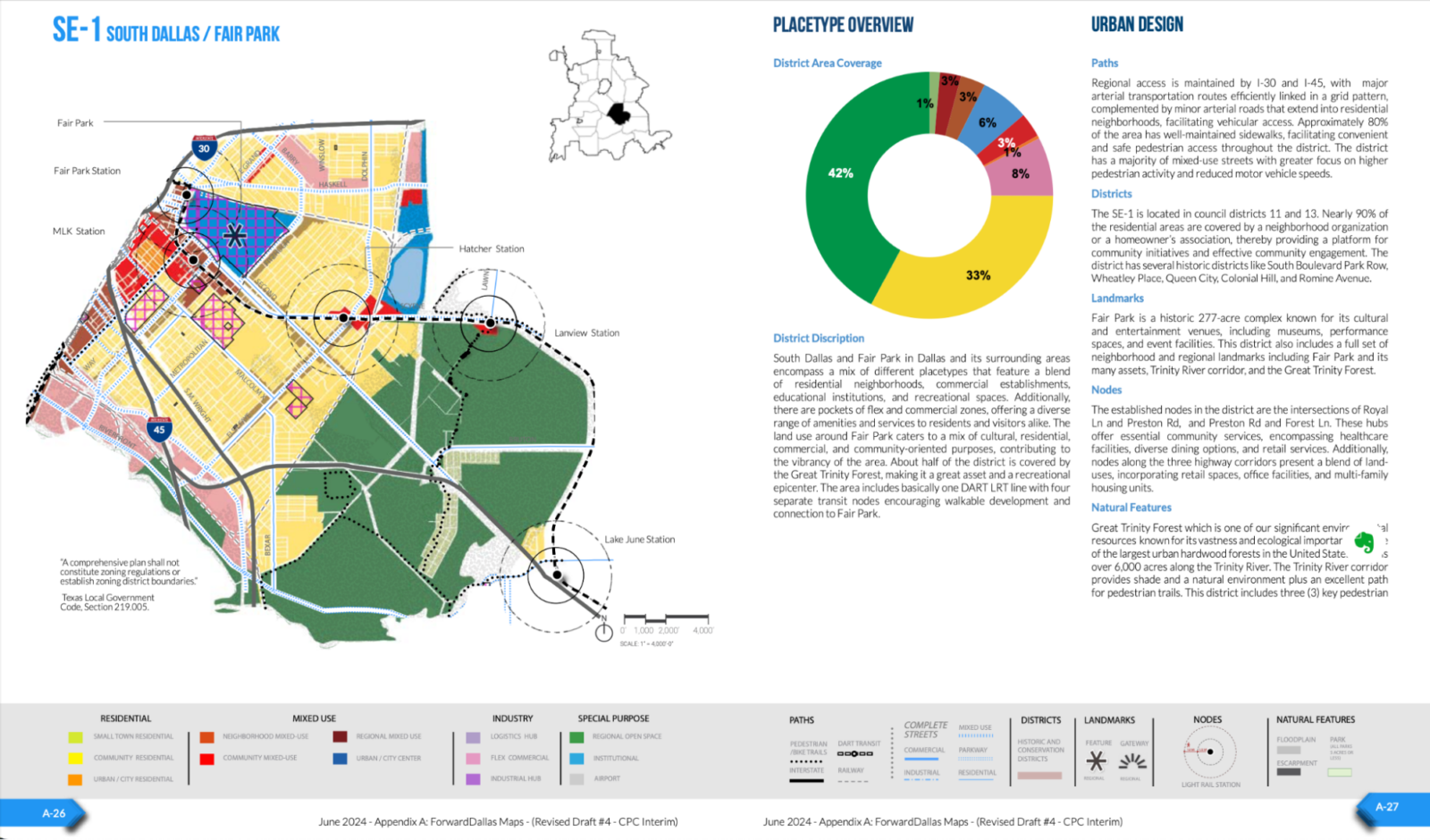
South Dallas and Fair Park simultaneously are undergoing a community planning process, with an area plan that could receive a stamp of approval in early 2025. The area plan aims to update plan development district (PD) 595, created in 2001, so that South Dallas will be more welcoming to the kinds of businesses neighbors desire.
However, because the original boundaries of PD 595 do not include the land behind Railroad Avenue, neither does the draft of the South Dallas/Fair Park Area Plan.
“That is a technical thing,” says certified planner Caleb Roberts, executive director of Downwinders at Risk. “The intent of the neighborhood plan is to stop stuff like this, and we are right next to the area plan, so those same principles should apply.”
Foward Dallas Placetypes – Regional Open Space by Dallas Free Press on Scribd
Neighbors have environmental concerns
H.S. Thompson Elementary School, which reopened just three years ago after a $33 million renovation, is right down the street from a row of sites behind the railroad tracks with industrial zoning. Mixon says parents from the school are very concerned about the environmental impact that a possible dumping ground could have on their children and the community.
The Dallas Housing Authority is planning a $45 million senior living facility nearby on Bethurum Avenue as part of the Bonton Neighborhood Master Plan, which also includes a park, lake and Dallas service center.
“Wind has no bounds,” Roberts says. “As soon as these things are created, it doesn’t matter if it’s out of sight — if that wind changes and blows into that residential community, that’s where you have the problems.”
In July, one of the property owners who owns land behind Railroad Avenue contacted South Dallas’ District 7 plan commissioner Tabitha Wheeler-Reagan. Wheeler-Reagan, who also runs a private architectural planning firm, was approached to draft plans for an auto repair shop on the property. Upon discovering that the owner also operates several salvage yards, Wheeler grew concerned about the property’s potential use, especially given the area’s IR zoning. She declined to draft the plans.
Neighbors want a community park
Recognizing that IR zoning makes the area vulnerable, Wheeler-Reagan reached out to Mixon and suggested a zoning change.
“We want to stop them from building whatever that industrial research allows them to build,” Roberts says. “That’s our number one goal.”
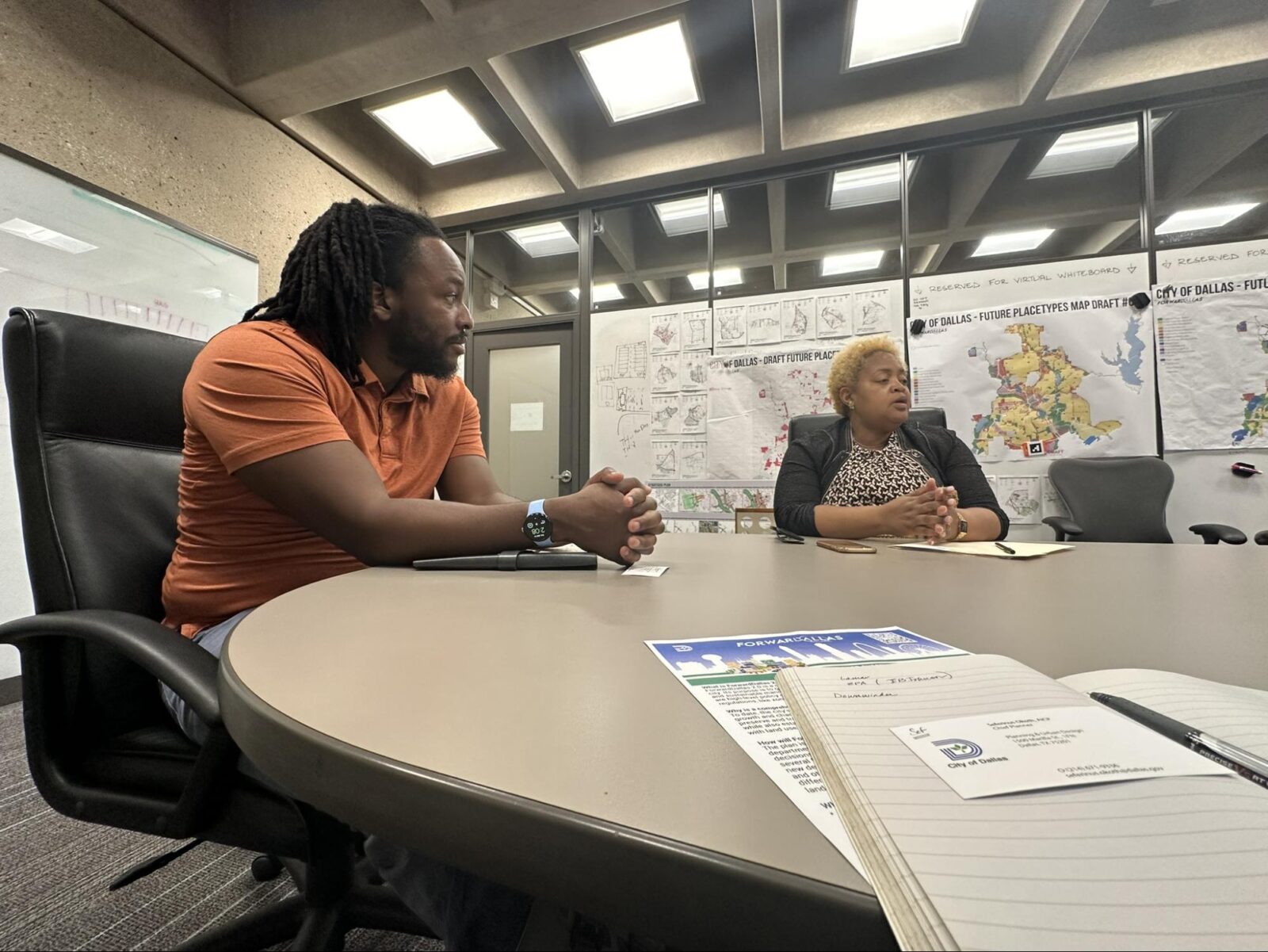
Roberts joined Mixon during a community meeting she hosted and later, to meet with City of Dallas zoning officials in late August. They asked for the land to be rezoned as agricultural space, in line with the Forward Dallas plan. Roberts says that designation fits because most of the land behind Railroad Avenue is in a floodplain with so much open, undeveloped space.
While the community may want a park, city officials suggested that commercial zoning may be a better alternative. They said there are several other property owners behind Railroad Avenue, and it may be difficult to convince all of them to turn the land into agricultural zoning for a park.
“From where Forward Dallas is now, [this] seems to be something that you all at the City believe shouldn’t be industrial,” Roberts says. “How are we building our residential community the way that we promised the residents?”
The City doesn’t want to pay for private property
Chief Planner Sef Okoth oversees any rezoning requests initiated by the City of Dallas. He told Mixon and Roberts that “the City is not going to use their money on private property to improve it or maintain it.”
“Well, you did do that on Bexar Street,” Mixon says, reminding the City officials that Dallas spent more than $30 million on Bexar Street for housing and economic development finished in 2014.
“That was a special arrangement,” says Okoth, who worked on the Bexar Street project.
“I do not think that we are going to spend [millions] on Bexar Street for economic development growth to allow a dump site to be just a block over,” Mixon says.
“Using public dollars for private property opens a floodgate for people to ask for something similar,” Okoth says.
Okoth says the process to rezone the area could take years because there is a long waiting list for properties to be evaluated for rezoning.
“If this area was part of an existing area plan, we could easily score it high so it goes to the top of the list,” Okoth says. Plan Commissioner Wheeler says the area behind Railroad Avenue is part of the 2006 Comprehensive Dallas Area Plan. She’s also reached out to Councilmember Adam Bazaldua, who represents South Dallas and appointed Wheeler to the Plan Commission, to ask for a public hearing to speed up the process.
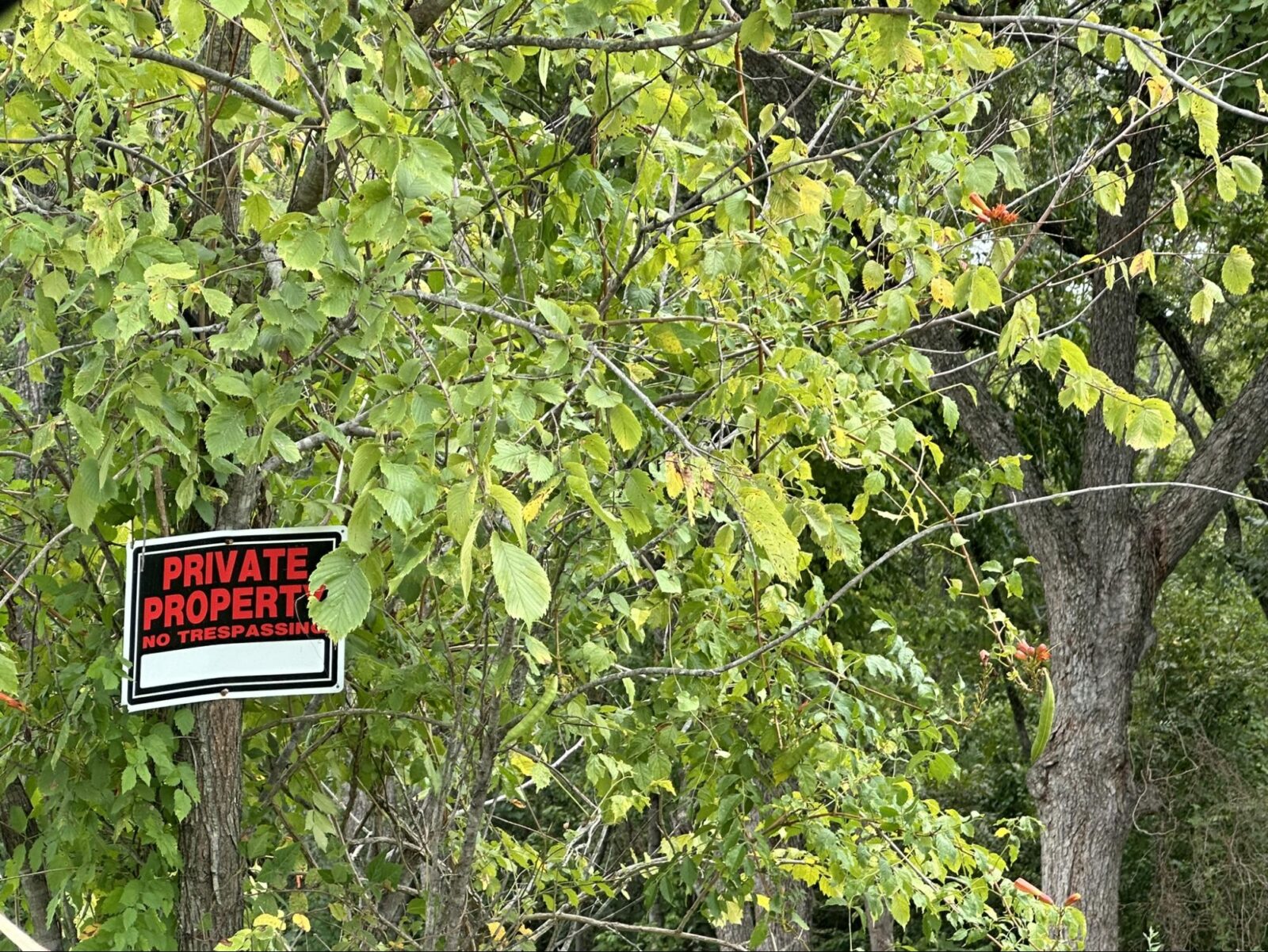
Can anything really be done?
Existing businesses often are grandfathered in as part of the zoning regulations when the property was bought. Right now, Roberts says property owners behind Railroad Ave. can build big.
“Time is the absolute hardest thing for us to deal with because this doesn’t need any approval or anything to move forward, right?” Roberts asks.
“What stops them?” asks Mixon.
“Nothing,” Okoth says. “It is going to be very hard for us to stop them.”
Share This Story, Choose Your Platform!

Sujata Dand is an award-winning journalist who is energized by change brought in communities in response to news stories. She lives in and has spent most of her reporting career in Dallas, with ample experience covering health care, education and public policy.
“I think it’s important to elevate voices that are often ignored,” Dand says. “For me, that means meeting the people in our communities. We need to see people and listen to them. It’s often a huge act of courage for people to openly share their lives. So, I feel an enormous responsibility in making sure my stories are authentic and fair.”
Dand worked at KERA for almost 10 years, where she produced several television documentaries, including “Life in the Balance: The Health Care Crisis in Texas” and “High School: The Best and the Rest.” She also headed the multimedia project “Boyfriends,” which examined the complex personal and cultural factors that contribute to the way adolescent girls form and maintain relationships. Her work has garnered several local Emmys and national awards including a Gracie for best reality program.
Prior to her work with KERA, Sujata was a reporter and anchor at the CBS affiliate in Wichita Falls, Texas. She has worked as a freelance reporter for NPR and Dallas Morning News. Dand is a graduate of Trinity University in San Antonio.
Areas of Expertise:
health care, education, public policy
Location Expertise:
Dallas, Texas
Official Title:
Senior Editor and Reporter
Email Address:
sujata@dallasfreepress.com



